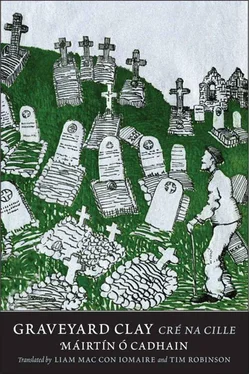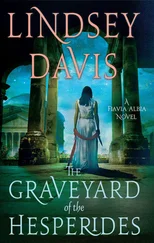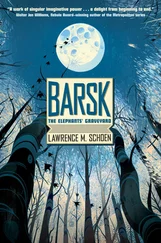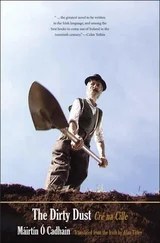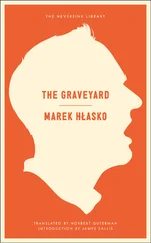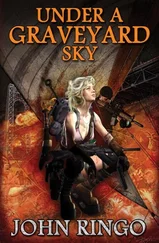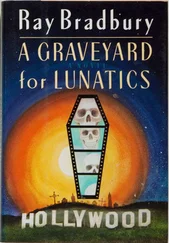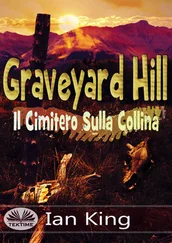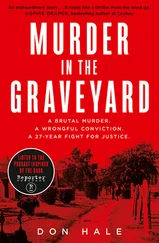“Pionta,” says he, and he gave me the nod … The two of us went over by the shore to Peadar the Pub’s. He stood me two pints. Back we came to the field. I gave him another word. “Pionta,” says he. “Pionta,” says I. Over we went again. Two more pints. Back to the field again. I gave him another word. Over again. Back again. Over and back like that all day long. Me giving him a word for each pint, and he giving me a pint for each word …
— … I fell off a stack of oats, indeed …
— … Do you think I grew in a cabbage patch, that I was never at the pictures? …
— An old fellow like you?
— An old fellow like me? I wasn’t always old, you know!
— They’re really lovely. I saw beautiful things at the pictures. Houses like the Earl’s house …
— I saw a fine cross there, and I’d say it was made out of Island limestone …
— I saw lots of trousers-women …
— And black women …
— And people of culture, nightclubs, quays, tall ships under sail and mariners with skins of every colour. Honest …
— And the odd ugly streak of misery …
— And women with sweet malicious smiles, like Siúán the Shop when she’d be refusing you cigarettes …
— And women with wily intentions, like Peadar the Pub’s daughter, waiting inside the door to play the parlour trick on some poor unsuspecting customer …
— You’d see fine big colts, faith …
— And football matches. But I swear to God Concannon would make curds and whey of the backside of any of those footballers …
— You wouldn’t see any drift-weed at all at the pictures …
— Or two thatchers on opposite sides of a house …
— Or nettles like there were in Donagh’s Village …
— Or flea-ridden hillocks like there were in your own village …
— I’d prefer Mae West myself to any of them. If I got a new lease of life my only wish would be to see her again. She’d be a great woman to handle a colt, I’d say. Myself and the young fellow were in Brightcity the night before the fair. We had a few pints. “That’s enough now,” says I. “If we overdo it we could easily put a hole in the price of the colt.” “It’s too early to go to bed yet,” says he. “Come on to the pictures.” “I was never at the pictures,” said I. “What harm?” said he. “Mae West will be on tonight.” “Faith then, if that’s the case, I’ll go.”
In we went. A woman came on. A fine big woman, faith, and she began to smile at me. I began to smile back at her. “Is that her?” said I. “Arrah, not at all!” said the young fellow. Soon another fine stump came on. She placed a hand on her hip. She tilted herself to one side and began to smile at us all. We all began to smile back at her.
“That’s her now,” said the young fellow.
“Look at that!” said I. “She’d be a great one to handle a colt, I’d say. As soon as the stable is finished a young fellow like you could do worse than find a young little rump of a woman for himself. But I wouldn’t advise you to have anything to do with the likes of her. She’d be good at handling the colt alright, but …”
“But what!” said the young fellow …
A stout little man came on then, like that paunchy fowler who comes to Jack the Scológ’s, and he was talking to the two women. He began to wave his arms wildly in the air. Another stumpy little man came out. The spitting image of that gent who comes fishing to Nell Pháidín’s — Lord Cockton. Mae West said something to him. Indeed, the young fellow told me what it was, but for the life of me I can’t think of it now …
The stout little man’s cheeks puffed up as if he had a balloon in his mouth and he put the palms of his hands against his ribs. He was very fat and out of breath. I’d say he was a man who had a weak heart, God help us! …
— … Only once, Cite. That’s as often I was ever at the pictures. I’d much rather see them again than to know what life held in store for me. It was the time my daughter who’s married in Brightcity was having a baby. I spent a week there minding her. She was convalescing at this stage. Her husband came in from work one evening. He had his dinner, and dressed himself.
“Were you ever at the pictures, Bríd Terry?” said he.
“What are they?” said I.
“There are all sorts of pictures shown in a place up there,” said he.
“In the church?” said I.
“Not at all,” he said, “the pictures.”
“Pictures of Jesus Christ and the Virgin Mary, and St. Patrick and St. Joseph?” said I. “Not at all,” he said, “foreign countries and wild animals and peculiar people.” “Foreign countries and wild animals and peculiar people,” said I. “Upon my soul, I won’t go near them at all. How do I know, the Lord between us and all harm! …”
“You have the mind of a peasant,” he said, in stitches laughing at me. “They’re only pictures. They can’t harm you.” “Wild animals and peculiar people,” says I. “Who knows what might happen?”
“There’ll be a picture about America on tonight,” says he.
“America,” says I. “I wonder would I see my own dear Bríd and Nóirín — God be with them! — and Anna Liam …”
“You’ll see people like them,” he said. “You’ll see America.”
And of course I did. There never were such wonders! A pity I can’t describe them! That wretched fire destroyed my memory completely! But I can assure you, Cite, everything was as clear to me as if I had been over there beside them. There was an old woman there cleaning the door with a cloth, with a grimace like Caitríona Pháidín’s face when she’d see Nell and Jack the Scológ going past her up home from the fair …
— Ababúna!
— And there was a fine spacious room there, Cite, with a roundtable like the one you gave the pound to Caitríona to buy, that she never paid back …
— That’s a damn lie …
— And there was a silver teapot like the one in Nell’s, sitting on top of it. And a man in black clothes with golden buttons opened the door. I thought it was the Red-haired Policeman, till I remembered they were in America. Another man came in wearing what looked like a postman’s cap, and the man of the house and himself began to argue. The man with the golden buttons and himself caught the man of the house and threw him down the stairs. I thought he’d be a heap of bones because there were three or four flights of stairs below. Then they threw him out the door on top of his head and he nearly upended the old woman. Honest to God , Cite, I felt sorry for her. Her head was in a tizzy.
Then the man of the house looked back and waved his fist at the man who threw him out. I thought it was the Big Master — the same snub nose and slit eyes — and that it was Billyboy the Post who threw him out, till I remembered they were in America. I knew that whatever about the Big Master being in America that Billyboy the Post couldn’t be there, with the post to be delivered every day …
— The ruffian! The lecher! The …
— This man who you’d take for Billyboy went up the stairs again to the room, and there was a woman there wearing black clothes with flower prints.
“That’s the Schoolmistress, if I’m not dreaming,” says I to myself. But then I remembered that they were in America and that the Schoolmistress was teaching school at home a few days before that …
— The trollop …
— De grâce , Master … Now, Dotie …
— The man with the golden buttons opened the door again. Another woman came in who had a snub nose and a fur coat just like the one Baba Pháidín had when she was home from America, till she had to get rid of it on account of all the smudges of soot in Caitríona’s …
Читать дальше
